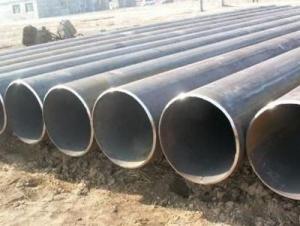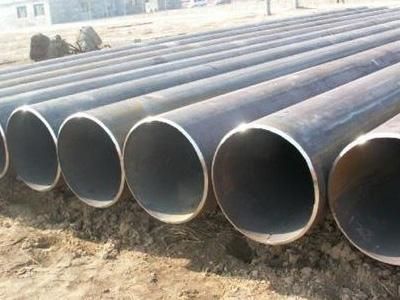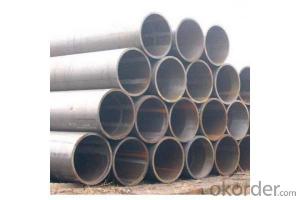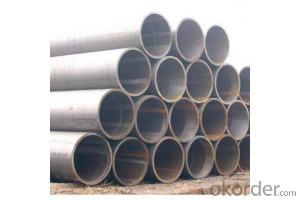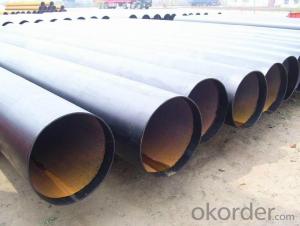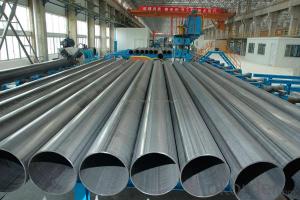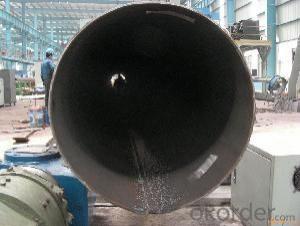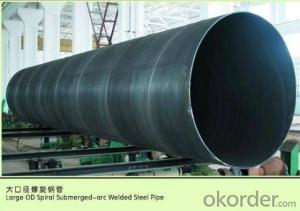LSAW SSAW CARBON STEEL PIPE ASTM API PSL1 PSL2 PIPE LINE 18''
- Loading Port:
- Tianjin
- Payment Terms:
- TT OR LC
- Min Order Qty:
- 1 m.t.
- Supply Capability:
- 3000 m.t./month
OKorder Service Pledge
OKorder Financial Service
You Might Also Like
Packaging & Delivery
Packaging Detail: | Normal exporting packing,in container or bulk vessel or as per clients' request |
Delivery Detail: | 2 months after confimed contract |
Specifications
Large Diameter API 5L X70 PSL2 LSAW Steel Pipe
Grade: X42, X46, X50, X52, X60, B, C
OD: 1.5"-28"
WT: SCH10-SCH160
Large Diameter API 5L X70 PSL2 LSAW Steel Pipe
Specifications:
u Standard: API 5L
u Grade: B, C, X42, X46, X50, X52, X56, X60, X65, X70, X80
u OD: 1.5"-28"
u WT: SCH10-SCH160
u Length: 5-12m
u Ends Finish: plain end, bevel end, grooved end
u Surface Treatment: bare, black varnished, oiled finish, red color, anti-corrosion, 3PE, FBE or epoxy coating
u Technique: hot rolled or cold drawn
u Application: api 5l steel pipe for conveying oil, water, gas
u Invoicing: based on theoretical weight or actual weight
u Payment Terms: L/C at sight, T/T or Western Union
u Trade Terms: FOB, CFR, CIF
u Certification: ABS manufacturing assessment, ABS design assessment, API 5CT, API 5L, DNV manufacturer certificate, ISO9001 quality management system certificate, ISO14001 environment management system certificate, GB/T28001 occupational health and safety management system certificate, A1 class manufacturing license of special equipment certificate, CCS, GL, LR, SGS, TüV, PDE
- Q: What are the different types of hangers used for supporting steel pipes?
- There are several different types of hangers used for supporting steel pipes, including clevis hangers, riser clamps, U-bolts, beam clamps, and pipe rollers. Clevis hangers have a clevis-shaped bracket that attaches to the pipe and can be suspended from a beam or threaded rod. Riser clamps are used to support vertical pipes and are typically attached to a wall or structural member. U-bolts are used to secure pipes to beams or other structural elements. Beam clamps are designed to attach to overhead beams and provide support for the pipe. Pipe rollers are used to support pipes on horizontal surfaces and allow for easy movement or rotation.
- Q: What is the difference between internal and external coating for steel pipes?
- A protective layer is applied to the inner surface of steel pipes, which is known as internal coating. The main purpose of this coating is to prevent corrosion and enhance resistance against chemicals present in the fluid being transported. Techniques like spraying, brushing, or dipping are commonly used to apply the internal coating, and it can be made of materials such as epoxy, polyurethane, or cement mortar. On the contrary, external coating involves the application of a protective layer on the outer surface of steel pipes. The main objective of this coating is to protect against environmental factors like corrosion, abrasion, and impact. External coatings are usually applied through methods like wrapping or coating with materials such as polyethylene, fusion-bonded epoxy, or asphalt enamel. To summarize, the primary difference between internal and external coating for steel pipes lies in their location and purpose. Internal coatings safeguard the inner surface from corrosion and chemical attacks, while external coatings provide protection against environmental damage on the outer surface. Both types of coatings are essential to ensure the durability and reliability of steel pipes in various applications.
- Q: What does "steel pipe SC" mean?
- SC (run in welded steel duitconSC is the line laying mode GB letter of wire is worn steel pipe laying (welded steel pipe, low pressure fluid) SC70 said the conductor by low pressure fluid DN70 welded steel pipe as protection pipe laying, DN70 said the nominal pipe diameter is 70mm, the nominal pipe diameter is 70mm (a series of values, the actual diameter slightly different).
- Q: Can steel pipes be used for wastewater treatment?
- Yes, steel pipes can be used for wastewater treatment. Steel pipes are commonly used in various stages of wastewater treatment processes, such as conveyance, distribution, and collection systems. They are durable, corrosion-resistant, and can withstand high-pressure conditions, making them suitable for transporting wastewater efficiently and safely. Additionally, steel pipes can be coated or lined to enhance their resistance to corrosion and improve their performance in harsh wastewater environments.
- Q: What are the different methods of insulation for steel pipes?
- There are several methods of insulation for steel pipes, including thermal insulation, such as fiberglass or mineral wool wraps, foam insulation, such as polyurethane or polyethylene foam, and reflective insulation, like foil-faced insulation. Each method has its own advantages and is chosen based on factors such as the intended use, temperature range, and desired level of insulation.
- Q: How do you calculate the pipe buoyancy for steel pipes in water?
- The buoyancy of steel pipes in water can be calculated by determining the weight of the water displaced by the submerged portion of the pipe. This can be done by multiplying the volume of the submerged portion of the pipe by the density of water. The buoyant force acting on the pipe can then be calculated by multiplying the weight of the displaced water by the acceleration due to gravity.
- Q: How do steel pipes resist corrosion?
- Steel pipes resist corrosion through various methods, primarily due to the protective properties of the material itself. Firstly, steel contains a small amount of carbon, which creates a thin, invisible layer on the surface of the pipe known as a passive film. This film acts as a barrier, preventing oxygen and moisture from reaching the underlying steel and thus inhibiting corrosion. Additionally, steel pipes are often coated with protective materials such as zinc, epoxy, or polyethylene, which provide an additional layer of defense against corrosion. Regular maintenance and inspections also play a crucial role in preventing corrosion by identifying and addressing any potential vulnerabilities in the pipes.
- Q: What's the difference between the fastener type steel pipe scaffold, the floor type steel pipe scaffold and the overhanging type steel pipe scaffold?
- It is made up of steel pipe, fastener, base, foot board, safety net and so onSteel pipe rod: generally there are two kinds, an outer diameter 48mm, wall thickness 3.5mm; another kind of outer diameter 51mm, wall thickness 3mm; according to its location and function is different, can be divided into vertical pole, horizontal rod, sweeping rod, etc..Fasteners: fastener is the connection between the steel tube and steel tube, which has three forms, namely the right angle fastener, rotating fastener, butt joint fastener: rectangular fastener for connecting the two vertical pipes, it depends on the friction between the fastener and the steel pipe to transfer load. Swivel fastener: used for connecting two steel tubes intersecting at any angle.
- Q: Can steel pipes be used for the construction of tunnels?
- Yes, steel pipes can be used for the construction of tunnels. Steel pipes are often used as support structures in tunnel construction due to their strength, durability, and ability to withstand high pressures. They can be used for various purposes such as drainage, ventilation, or as part of the tunnel structure itself. Additionally, steel pipes can be easily manufactured, transported, and installed, making them a popular choice in tunnel construction projects.
- Q: How are steel pipes used in plumbing systems?
- Steel pipes are commonly used in plumbing systems due to their durability and strength. They are typically used for water supply lines, sewage lines, and gas lines. Steel pipes are resistant to corrosion, making them a reliable choice for long-term use. They are often used in high-pressure systems and are known for their ability to withstand extreme temperatures. Additionally, steel pipes are easily accessible and cost-effective, making them a popular choice in plumbing installations.
Send your message to us
LSAW SSAW CARBON STEEL PIPE ASTM API PSL1 PSL2 PIPE LINE 18''
- Loading Port:
- Tianjin
- Payment Terms:
- TT OR LC
- Min Order Qty:
- 1 m.t.
- Supply Capability:
- 3000 m.t./month
OKorder Service Pledge
OKorder Financial Service
Similar products
Hot products
Hot Searches
Related keywords
